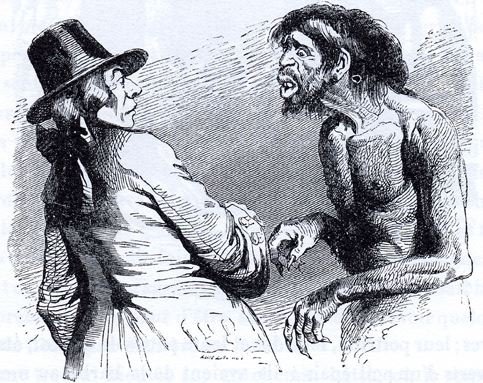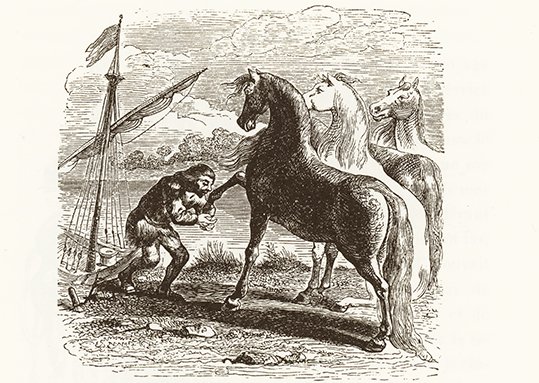Facing Paradox
By Larissa Fitzpatrick | April 9, 2016
In the mock travel narrative, Gulliver’s Travels, Jonathan Swift chastises humanity for hostile behavior, believing that people capable of reason fail to act reasonably when blinded by their personal illusions of reality. More than two centuries after Gulliver’s Travels was written, Ernest Becker also perceived a link between illusion and violence. Becker theorized that humans, terrified of their inevitable death, create a world of symbols, or immortality ideologies, that give their lives meaning and stability. Our need to conceal our death anxiety is so powerful that we often become intolerant of people with ideologies that threaten our own. Although living in different centuries and nations, Becker and Swift commonly found frustration in mankind’s inability to see reality and failure to reach its highest potential.
To show readers the danger of distorted reason, Swift uses satire to call attention to paradoxes, hoping to reveal the absurdity in certain accepted beliefs and behaviors. In the fourth book of Gulliver’s Travels, Gulliver enters the land of the Houyhnhnms, where he finds himself surrounded by difficult paradoxes, many of which are self-inflicted. He encounters two new groups of beings: one appears to have reason and one does not. Gulliver’s fear of insignificance among these groups drives him to blindly follow the individuals with reason, ironically leading him to become completely unreasonable. We, like Gulliver, experience many paradoxes in our lives. We are born only to die, and by attempting to conquer our anxiety, we make the world a more menacing place. However, by using self-analysis, unlike Gulliver, we can see the absurdity in our situation. By wrestling with our fears rather than denying them, we can analyze our behavior without dangerous bias, allowing us to experience our knowledge of death as a method of embracing life.
…people capable of reason fail to act reasonably when blinded by their personal illusions of reality.
When Gulliver arrives in the land of the Houyhnhnms he is posed with an interesting problem: there are two types of creatures, and Gulliver, being human, is neither one. The Houyhnhnms, the more powerful of the two groups, are portrayed as intelligent horses, allowing Swift to test the Aristotelian idea of a rational animal. The other inhabitants, the Yahoos, are brutish ape-like creatures. Seeing the Yahoos as dim-witted beasts, Gulliver quickly realizes that it is in his best interest to gain the respect of the Houyhnhnms. He contrasts himself against the Yahoos by emphasizing his intellect. The Houyhnhnms are perplexed by Gulliver; they acknowledge some sign of reason, but as he is not a Houyhnhnm, they declare him a Yahoo nonetheless. They allow Gulliver to remain in their society, but continue to view him as inferior. Gulliver grows increasingly self-conscious, eventually believing that he is a Yahoo. He laments, “My Horror and Astonishment are not to be described when I observed, in [the Yahoo], a perfect human Figure” (GT 195). Gulliver becomes so absorbed with denying his Yahoo nature and striving to be Houyhnhnm-like, that he fails to realize he is neither one.
With the Houyhnhnms and Yahoos, Swift plays with what extreme versions of man’s dual nature might look like. While Gulliver is struggling to identify between two literal groups, our battle of duality is within: our bodies are temporary, but our minds are limitless. Humans have the same instincts to survive as every other animal, but we have the intelligence to understand that eventually efforts to live on will prove useless. Becker explains that man is paradoxically “up in the stars and yet housed in a heart-pumping, breath-gasping body” (Denial 26). The knowledge of death is terrifying, but just as distressing is the end of our contribution to the world around us. Becker says, “What man really fears is not so much extinction, but extinction with insignificance” (Escape 4). The fact that our entire self will perish with our body creates an enormous psychological dilemma.
Gulliver detests his new Yahoo identity, causing him to strive even further for the acceptance of the Houyhnhnms. He even begins calling the lead Houyhnhnm, “Master.” Gulliver desperately clings to the symbol of reason, which becomes the only distinguishing detail between himself and the Yahoos. Similarly, we also find ways to cope with the threat of animal insignificance. To defend ourselves against the anxiety of death, we conspire to keep it unconscious by filling our lives with rituals and behaviors that essentially make up culture. Becker says that “man needs a ‘second’ world, a world of humanly created meaning, a new reality that he can live, dramatize, nourish himself in” (Denial 189). This world of illusion is necessary for everyday human function, but unfortunately, it allows us to repress our death anxiety, pushing it into unconsciousness.
However, by using self-analysis, unlike Gulliver, we can see the absurdity in our situation.
As Gulliver strives fervently for the approval of the Houyhnhnms, he fails to question their reason, blinding himself to their dangerous conclusions. The Houyhnhnms follow the maxim that reason alone can govern, but by using reason without compassion, they consider Yahoo extermination to be justifiable. In order to further impress the Houyhnhnms and dissociate himself from the Yahoos, Gulliver becomes one of the biggest promoters of hatred toward the Yahoos. By worshiping the Houyhnhnms, Gulliver is ironically siding with the group that not only sees him as inferior, but is considering killing his kind.
Like the unexpected violence of the Houyhnhnms, Becker describes that “it is man’s ingenuity, rather than his animal nature, that has given his fellow creatures such a bitter earthly fate” (Escape 5). When we believe so strongly in our private illusions formed by the need to deny our mortality, we are likely to be intolerant, if not violent, toward groups with different views of reality. We use our intellect to support our cause, reasoning that the other group is wrong or even evil. Those with ideologies that do not match our own threaten to expose the very fallacies that sustain us. Paradoxically, our cultural immortality ideologies that we think promote good in the world often create misery for others.
While Gulliver is struggling to identify between two literal groups, our battle of duality is within: our bodies are temporary, but our minds are limitless.
Originally, Gulliver’s reason differentiated him from the Yahoos; but after following the rationality of the Houyhnhnms, he ends his adventure neighing like a horse and despising humankind, including his friends and family. Gulliver’s distress exudes absurdity not only because he has the ability to see his true nature, but also because he fails to appreciate having certain human qualities that the other two creatures lack. The Yahoos behave inhumanly because in them there is nothing to control passion or to shape it into human affection; conversely, the Houyhnhnms are reasonable, but Swift emphasizes their coldness and their absence of human compassion and empathy. By using Houyhnhnm reason and not his own, Gulliver distorts his reality and slips into a type of madness.
Although our vast intelligence creates much of the world’s violent behavior, it also remains the solution. Becker explains, “It is the disguise of panic that makes us live in ugliness, and not the natural animal wallowing. And this means that evil itself is amenable to critical analysis and, conceivably, to the sway of reason” (Denial xv). By contemplating our death and self-reflecting on our immortality symbols, we can break the cycle of earthy destruction. We will never be (nor should we aspire to be) fully rational Houyhnhnms, but we are not Yahoos either. We are a strange combination of both. Unfortunately, this leaves us with a terrifying awareness of our mortality, but it also allows us to enjoy life more deeply than any other animal.
“it is man’s ingenuity, rather than his animal nature, that has given his fellow creatures such a bitter earthly fate”
Unlike Gulliver, self-reflection must be used with the courage to look at oneself sincerely and without distortion. Becker hopes we can strive for “a lived, compelling illusion that does not lie about life, death, and reality; one honest enough to follow its own commandments…not to take the lives of others to justify itself (Denial 204). We must use our reason to place human life before the symbols we are emotionally tied to. By acknowledging, rather than denying the absurdity we are born into, we can learn to work through it, therefore using death to cherish life – our own as well as the lives of others.
Sources used:
Becker, Ernest. The Denial of Death. 1973. Reprint, New York: Free Press Paperbacks, 1997.
—, Escape from Evil. New York: The Free Press, 1975.
Swift, Jonathan. Gulliver’s Travels, edited by Albert J. Rivero. New York: Norton, 2002.
After growing up in a small town in northern Montana, Larissa attended college in San Francisco, where she first discovered the works of Ernest Becker. Since then, she has enjoyed finding connections between Becker’s theories and the world around her, especially through the lenses of history and literature. She currently spends her summers working at a fishing lodge in rural Alaska, using her winters off to travel, work and write in other countries from Russia to Ecuador.



